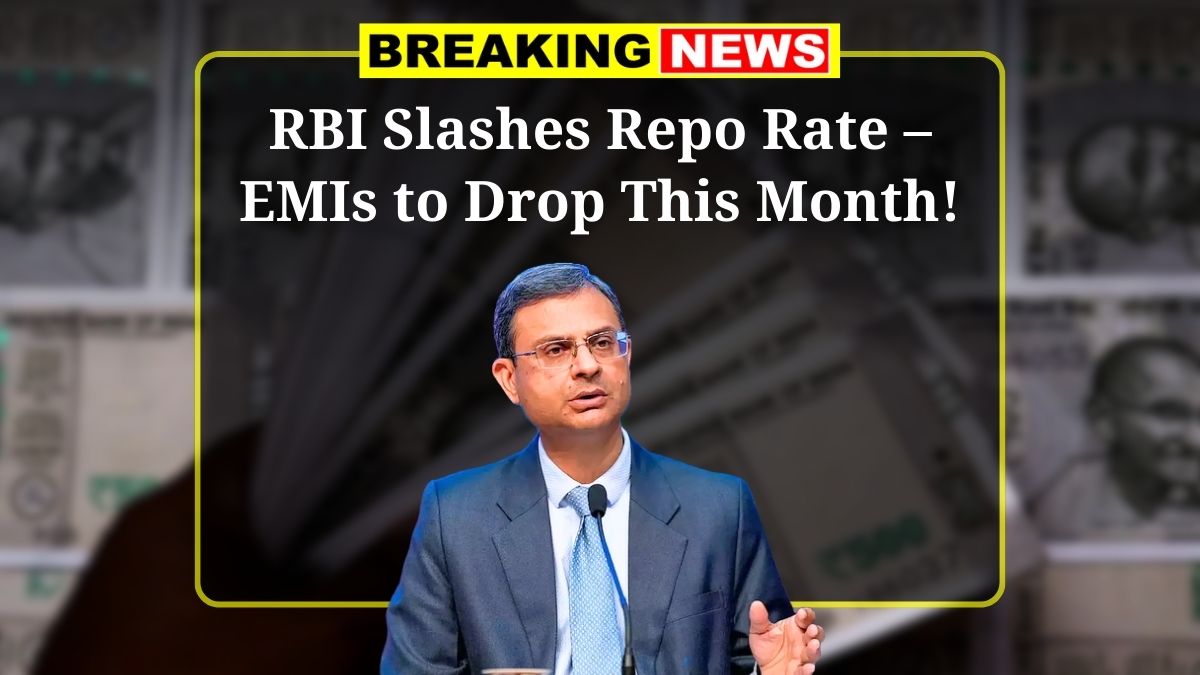RBI Cuts Repo Rate – In a move that’s bound to bring some cheer to millions of Indians, the Reserve Bank of India (RBI) has announced a reduction in the repo rate by 0.25%. That means the repo rate now stands at 4.90%, down from 5.15%. For most of us, this essentially translates to lower interest rates on home loans, car loans, and other borrowings—giving households some much-needed breathing room financially.
The repo rate is basically the rate at which RBI lends money to commercial banks. When it goes down, banks typically follow suit and bring down their own lending rates. This move is clearly aimed at boosting the economy by encouraging people to borrow more and spend more—whether it’s on a new house, a car, or even for expanding a small business.
How It Helps You: Cheaper Loans and EMIs
Let’s break down what this means for the average borrower. Home loans are expected to get cheaper, so if you’ve been thinking of buying a house or refinancing your current mortgage, this is probably a good time. Lower interest rates mean lower EMIs, which means more money left in your pocket every month. Car loans are also expected to see a dip in interest rates, which could push more people to make vehicle purchases. And it’s not just limited to home and auto—personal loans, education loans, business loans, and even agricultural loans will become slightly more affordable.
Here’s what the new rates are looking like across sectors. For housing, the interest rate is now 6.50%, down from 6.75%. Auto loans have come down to 8.25% from 8.50%, and personal loans are at 9.75%, down from 10%. Business loans now carry an interest of 8.75%, while educational and agricultural loans have also dipped by 0.25%. Even fixed deposit rates have been trimmed to 5.25%, which isn’t great news for savers but does signal easier borrowing conditions.
What Borrowers Can Expect
With borrowing becoming cheaper, monthly EMIs are set to decrease. This will naturally boost household savings and could lead to increased investment in other areas. Plus, access to credit is expected to improve as financial institutions get more comfortable lending at lower rates. One of the biggest sectors that might see a revival is real estate. Affordable home loans usually translate into more demand, and we could see more people finally taking the plunge into home ownership.
How Banks Are Reacting
Banks haven’t wasted any time in revising their interest rates. State Bank of India (SBI), ICICI Bank, and HDFC have all reduced their home and car loan rates by 0.25%. For example, SBI’s home loan rate is now 6.75%, and ICICI’s has dropped to 7.00%. HDFC has also brought its rate down to 6.90%. Similar changes are seen in car loan rates too, where reductions are helping make vehicles more accessible to the average buyer.
Experts Say It’s a Good Move
Financial analysts are broadly supportive of the RBI’s decision. They believe this rate cut is both timely and necessary, especially considering the sluggish economic activity in recent months. According to them, lower interest rates will boost consumer confidence, encourage people to spend and invest, and generally give the economy the push it needs. It’s seen as a smart, strategic move by the central bank to combat the current slowdown.
People Seem Optimistic
The response from the public has been quite positive so far. Many prospective homebuyers are now actively looking at properties, motivated by the promise of cheaper loans. People who were sitting on the fence about big purchases like cars or renovations are also feeling more confident about going ahead. Overall, there’s a noticeable uptick in consumer sentiment, and that’s always good news for the economy.
Going forward, the RBI has made it clear that it will keep a close watch on the economy and is open to making further cuts if the situation calls for it. There’s also a chance that the government will roll out additional measures to complement this rate cut and support economic growth. For now, though, this move is being seen as a much-needed step in the right direction.
Disclaimer
The information provided in this article is for general informational purposes only and should not be considered as financial advice. Interest rates are subject to change based on RBI policies and individual bank decisions. Readers are advised to consult with financial experts or institutions for the most current and personalized loan options.




